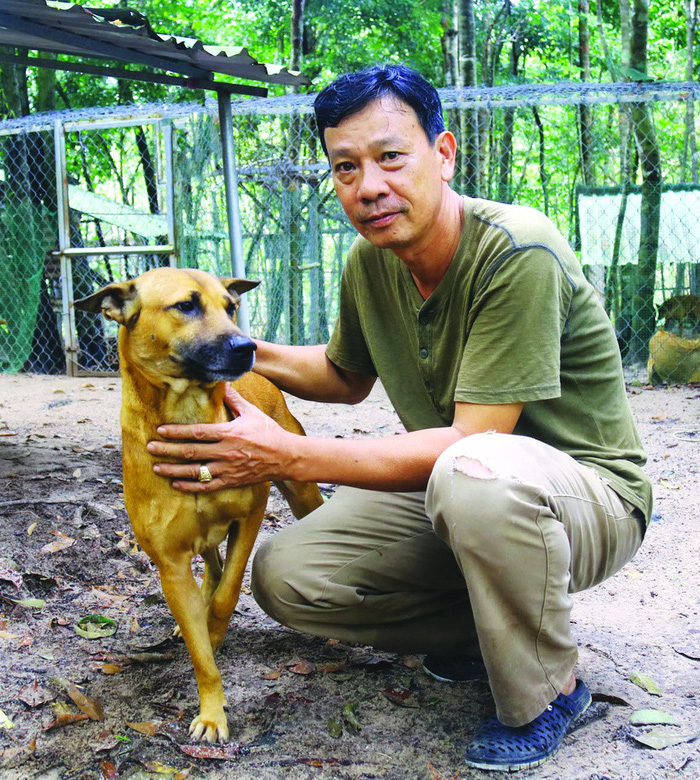For years, Tuan ‘dog’ has been completing the task of preserving and building a brand for the Vietnamese Phu Quoc Ridgeback, and would tell anyone without hesitation that this is his lifelong purpose.
The Phu Quoc Ridgeback originates from the eponymous island off the southern Vietnamese province of Kien Giang.
This rare species of dog is known for a ridge of hair that runs along its back in the opposite direction from the rest of the coat. Only two other breeds of dog have this distinctive feature, the Rhodesian Ridgeback and Thai Ridgeback.
The Phu Quoc dog is the smallest of the three ridgeback breeds, and has remained rare in Vietnam, which inspired Le Quoc Tuan to embark on the long journey to revive the breed in the late 1990s.
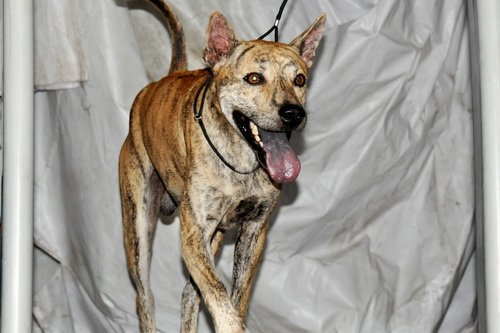 |
| A Tuoi Tre file photo of the Phu Quoc Ridgeback |
Initial failures
Twenty years ago, Tuan made a fortune when his shrimp farms in Kien Giang repeatedly yielded an extremely high profit in the 1997-98 period.
Tuan managed to save VND500 million, which equaled some US$41,000 under that year’s foreign exchange rate, and decided to spend his savings on his quest to ‘restore’ the Phu Quoc dog breed.
The man left the mainland for Phu Quoc Island, where he sought information about the dog from locals and purchased a prime land plot to build a ‘dog farm.’
Phu Quoc at that time remained quite wild, with land available for sale at dirt-cheap prices, enabling Tuan to acquire a one-hectare piece of land for only VND300 million.
Tuan then traversed the island, looking for dogs that matched a set of standards, including the neck-to-tail ridge of hair, straight legs and webbed feet and a tapering-belly body with hair shorter than two centimeters.
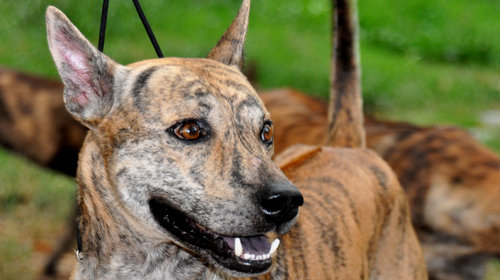 |
| A Tuoi Tre file photo of the Phu Quoc Ridgeback |
It took the ‘dog hunter’ a year to form a herd of some 80 canines and learn several lessons of experience from local islanders.
In the next two to three years, Tuan managed to run his dog farm smoothly, with the hounds fed with stewed fish.
Tragically however, during the 2001 rainy season, the precious herd of hounds started to suffer from diarrhea and vomiting, and eventually died en masse.
Tuan was left empty-handed and was given the nickname of Tuan ‘dog.'
 |
| A Tuoi Tre file photo of a pair of the Phu Quoc Ridgeback |
Success arrives
Tuan returned to the mainland to his shrimp farms, but it did not mean he had given up.
He put his effort in raising the shrimp with only one goal – to have money to continue raising the dogs.
Two years later, Tuan ‘dog’ saved enough money to return to his passion. This time, the man penned a project called “Preserving and Developing Phu Quoc Ridgeback,” due to which he could lease a 4.8-hectare land plot covered with protection forests on the island.
This new environment was believed to be more suitable for the hound development, and Tuan ‘dog,’ apparently learning from his failure, also had a vet work with him this time.
However, the doctor was unable to provide treatment when the canines became ill, prompting Tuan to take up the last possible solution – antibiotics.
“I divided the dogs into two groups and had one of them treated with antibiotics and compared the results,” he recalled.
“Simple as this may sound, it eventually took me two years to figure out a workable treatment plan.”
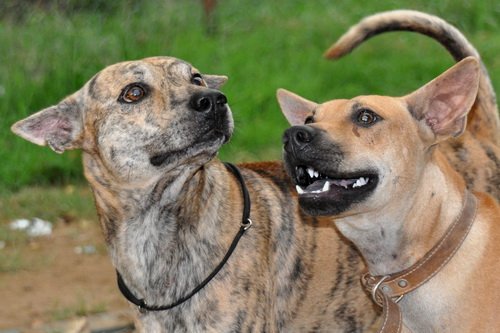 |
| A Tuoi Tre file photo of a pair of the Phu Quoc Ridgeback |
Success came in May 2005, when Tuan obtained the ‘exclusive brand’ certificate for his ridgeback hounds.
This means only dogs raised from his farm are legally recognized as ‘Phu Quoc Ridgebacks.'
Local manufacturers of Phu Quoc fish sauce, another delicacy of the island, have lost their exclusive brand to rivals in a regional country just because they failed to apply for the recognition in time.
“Fortunately, I did not fall into the same hole of the fish sauce manufacturers,” Tuan said.
Tuan said the biggest obstacle of bringing Phu Quoc dogs from the wild into a farm is to properly track their origin to be able to preserve the best genes.
Tuan said has contracted the biotech department of the Ho Chi Minh City-based Nguyen Tat Thanh University to take charge of this task, adding that he now has 400 hounds at his farm on Phu Quoc Island.
 |
| A Tuoi Tre file photo of the Phu Quoc Ridgeback |
Dog farm
The farm now sits quietly by the main road running south to north on the island, surrounded by the dense green forests.
Tuan operates his farm in a way that keeps the forests untouched by limiting the use of unnatural materials and alterations to the local landscape.
His farm is divided into different zones based on their functionalities.
Visitors to the farm will be taken through various locations where guard dogs, garbage-picking dogs, circus dogs and racing dogs are bred, the ‘birth hospital’ and a special zone for puppies.
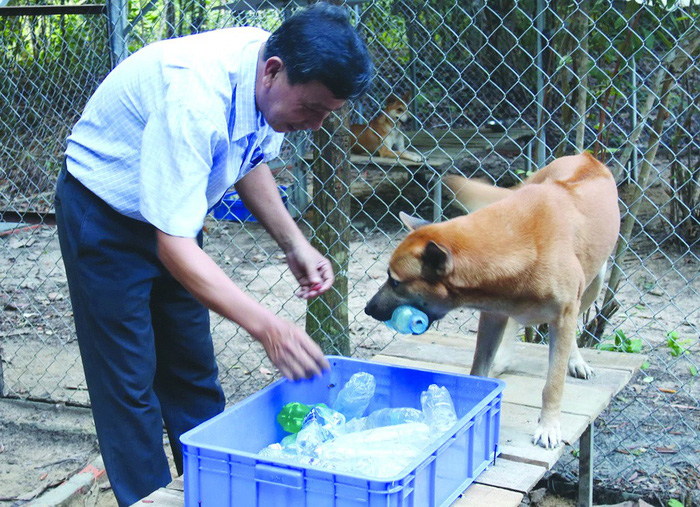 |
| An employee trains a Phu Quoc Ridgeback on collecting garbage at a farm on Phu Quoc Island, off southern Vietnam. Photo: Tuoi Tre |
The facility also features a 360-square-meter race track with 12 different surfaces and four racing courses, deliberately built to represent 360 days, 12 months and four seasons of the year.
A dog cemetery is zoned on a hill inside the farm.
Tuan funds his farm from selling tickets for visitors to have firsthand experience with the rare dog breed and watch them perform numerous skills.
Visitors are also able to enjoy the fresh air of the well-preserved woods, with peaceful streams and a huge collection of forest orchids.
“I can now rest knowing my dogs are growing sustainably,” Tuan said.
“My next project is to preserve the orchid and rose myrtle species typical of Phu Quoc forests.”
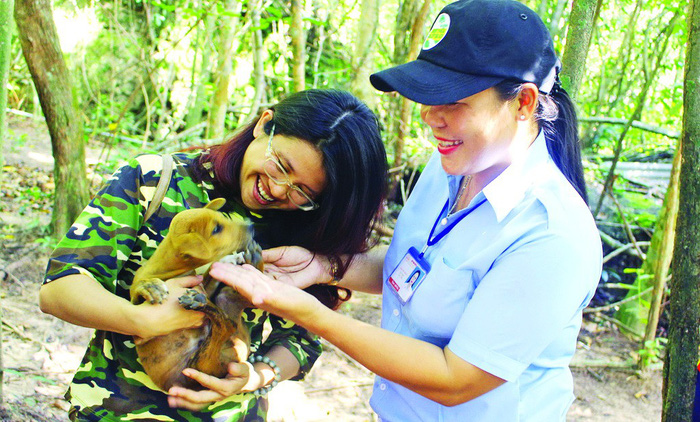 |
| A visitor (left) plays with a Phu Quoc Ridgeback at a farm on Phu Quoc Island, off southern Vietnam. Photo: Tuoi Tre |
Tuan said raising Phu Quoc Ridgebacks is not as complicated as widely thought, but quite easy. “You just try not to let them overfed or feed them with fatty rich food,” he said.
The hounds should strictly follow their vaccination schedules, he added.
As a wild hound, the dogs should be carefully kept inside the house and except for family members, they tend to attack any strangers who invade their ‘territory.’
Tuan said he has accomplished his lifelong goal of successfully preserving the Phu Quoc dog breed.
“I have exerted effort to keep this rare breed of dog and I believe it will be able to compete with other famous dog breeds around the world,” he said.
Like us on Facebook or follow us on Twitter to get the latest news about Vietnam!



